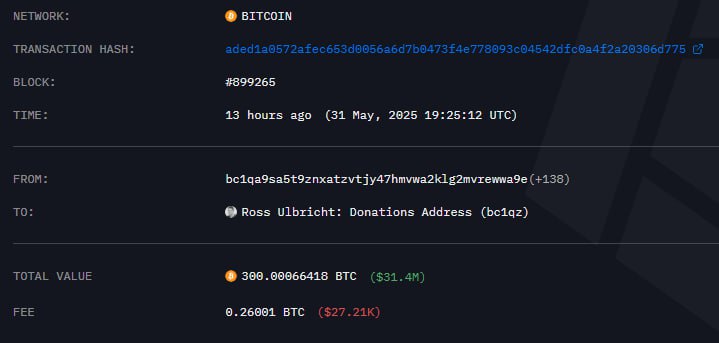Ross Ulbricht, the founder of the infamous darknet marketplace Silk Road, has received a staggering anonymous donation of 300 BTC, equivalent to $31.4 million, on June 1, 2025.
The funds were transferred to his official wallet address, as reported by blockchain analytics firm Lookonchain, marking one of the largest single donations in cryptocurrency history this year. This influx of wealth comes as Ulbricht, recently pardoned by former U.S. President Donald Trump, explores new ventures — including the potential creation of a new online marketplace—after facing rejection from eBay for listing his personal items.
A Massive Donation Amid a New Chapter
Ulbricht’s journey since his release from prison in January 2025 has been nothing short of remarkable. After serving nearly 12 years of a double-life sentence for operating Silk Road — a platform that facilitated anonymous transactions of illegal goods using Bitcoin—he was freed following Trump’s pardon on January 22, 2025.
The 300 BTC donation, which arrived just days after Ulbricht’s emotional speech at the Bitcoin 2025 conference in Las Vegas (May 27-29), underscores the enduring support he commands within the crypto community. During his speech, Ulbricht emphasized the importance of freedom, decentralization, and unity, values he believes should guide the future of cryptocurrency.

The donation adds to Ulbricht’s already significant crypto holdings. Prior to this transfer, blockchain researcher Conor Grogan from Coinbase identified approximately 430 BTC — worth around $47 million — in wallets potentially linked to Ulbricht that were untouched for over 13 years. Combined with the recent donation, his crypto assets are now valued at over $78 million, though it remains unclear whether he retains access to the private keys of the older wallets.
Auctioning the Past, Facing Resistance
 Ulbricht’s recent activities reveal his intent to move forward while symbolically closing the chapter on his past. He successfully auctioned personal and prison-related items through Scarce City, raising over $1.8 million in Bitcoin.
Ulbricht’s recent activities reveal his intent to move forward while symbolically closing the chapter on his past. He successfully auctioned personal and prison-related items through Scarce City, raising over $1.8 million in Bitcoin.
Notable items included his prison ID card, which sold for 5.5 BTC (approximately $575,000), a notebook for 1.06 BTC, and three prison paintings that collectively fetched 2.41 BTC.
Other memorabilia, such as his prison sneakers (0.54 BTC) and sweatsuit (0.51 BTC), also drew bids, alongside pre-arrest belongings like a djembe drum, backpack, and sleeping bag.
Ulbricht stated on the auction platform that these items represented a phase of his life he was ready to leave behind.
However, Ulbricht’s attempt to expand his auction efforts to mainstream platforms hit a roadblock. Inspired by the success of the Scarce City auction, he sought to list additional personal items on eBay, hoping to reach a broader audience.
Despite his efforts, eBay ignored his application, leaving it unanswered — a snub that some speculate may stem from Ulbricht’s controversial past.
This rejection has not deterred him but instead reignited his entrepreneurial spirit, prompting him to consider launching his own online marketplace.
A New Marketplace on the Horizon?
 Ulbricht’s interest in creating a new marketplace echoes his Silk Road days, though the context has shifted dramatically. Silk Road, launched in 2011, was a pioneering darknet platform that enabled anonymous transactions using Bitcoin, amassing 144,336 BTC (now worth over $15 billion) before its shutdown in 2013 and Ulbricht’s arrest.
Ulbricht’s interest in creating a new marketplace echoes his Silk Road days, though the context has shifted dramatically. Silk Road, launched in 2011, was a pioneering darknet platform that enabled anonymous transactions using Bitcoin, amassing 144,336 BTC (now worth over $15 billion) before its shutdown in 2013 and Ulbricht’s arrest.
The platform’s closure and Ulbricht’s subsequent sentencing in 2015 to two life sentences plus 40 years sparked widespread debate, with many in the crypto and libertarian communities arguing that his punishment was disproportionate to his crimes.
Critics, including Senator Rand Paul, highlighted that drug sellers on the platform often received lighter sentences.
Now, as a free man, Ulbricht appears to be leveraging his experience and the crypto community’s support to explore new ventures. Posts on X indicate that Ulbricht has teased the idea of a new online marketplace, with some speculating that eBay’s rejection may have been the catalyst.
While details remain scarce, his history with Silk Road suggests that any new platform would likely prioritize decentralization and user autonomy—principles he championed during his Bitcoin 2025 speech. However, such a move could attract scrutiny, given his past and the legal complexities surrounding his previous crypto holdings, some of which were seized by the U.S. government.
Also read:
- Who Is the Current King of the Darknet?
- Darknet Leak: 89 Million Steam User Records Up for Sale—70% of All Users Affected
- What Is Dark Social and How Can Marketers Use It?
Challenges and Opportunities Ahead
 Ulbricht’s path forward is fraught with challenges. Although pardoned, his association with Silk Road continues to polarize opinions. Prosecutors once described Silk Road as an “unprecedented one-stop online shopping mall” for illegal drugs, and Ulbricht’s conviction included allegations of a murders-for-hire plot, though no evidence of harm was found, and those charges were not pursued.
Ulbricht’s path forward is fraught with challenges. Although pardoned, his association with Silk Road continues to polarize opinions. Prosecutors once described Silk Road as an “unprecedented one-stop online shopping mall” for illegal drugs, and Ulbricht’s conviction included allegations of a murders-for-hire plot, though no evidence of harm was found, and those charges were not pursued.
The U.S. government seized much of Silk Road’s Bitcoin, auctioning 144,000 BTC in 2014 for just $334 each—a sum now worth billions. Whether Ulbricht will attempt to reclaim any remaining assets, as some pardon experts suggest he might, remains uncertain and could lead to prolonged legal battles.
On the other hand, Ulbricht’s story resonates deeply within the crypto community, as evidenced by the massive donation and the outpouring of support following his release.
Kraken, a major cryptocurrency exchange, donated $111,111 in BTC to help him reintegrate, and smaller donations have poured in, totaling over $270,000 by January 2025.
His vision for a new marketplace, if realized, could tap into this support, potentially offering a platform that aligns with the decentralized ethos of cryptocurrency while avoiding the illicit activities of Silk Road.
Conclusion
 Ross Ulbricht’s $31.4 million Bitcoin donation marks a pivotal moment in his post-prison journey, amplifying his financial standing and influence within the crypto world.
Ross Ulbricht’s $31.4 million Bitcoin donation marks a pivotal moment in his post-prison journey, amplifying his financial standing and influence within the crypto world.
The eBay rejection, while a setback, has sparked renewed interest in creating his own marketplace—a move that could redefine his legacy.
As Ulbricht navigates this new chapter, his actions will likely continue to stir debate, reflecting the broader tensions between innovation, regulation, and freedom in the evolving landscape of cryptocurrency.
Whether he can channel his past experiences into a legitimate and impactful venture remains to be seen, but for now, Ulbricht’s story continues to captivate and inspire.






